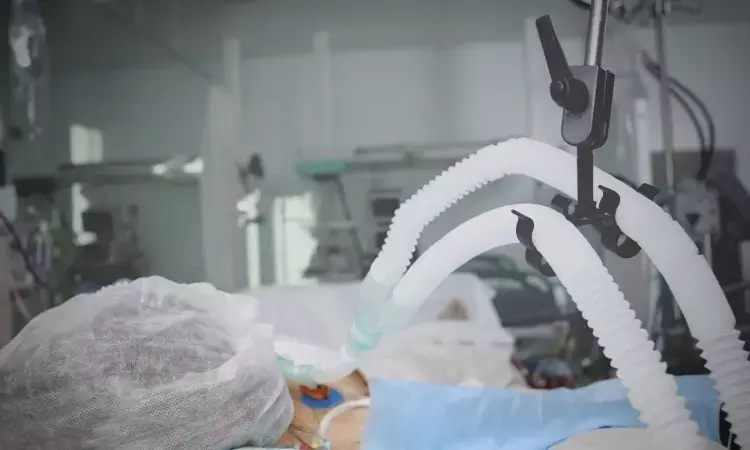- Home
- Medical news & Guidelines
- Anesthesiology
- Cardiology and CTVS
- Critical Care
- Dentistry
- Dermatology
- Diabetes and Endocrinology
- ENT
- Gastroenterology
- Medicine
- Nephrology
- Neurology
- Obstretics-Gynaecology
- Oncology
- Ophthalmology
- Orthopaedics
- Pediatrics-Neonatology
- Psychiatry
- Pulmonology
- Radiology
- Surgery
- Urology
- Laboratory Medicine
- Diet
- Nursing
- Paramedical
- Physiotherapy
- Health news
- Fact Check
- Bone Health Fact Check
- Brain Health Fact Check
- Cancer Related Fact Check
- Child Care Fact Check
- Dental and oral health fact check
- Diabetes and metabolic health fact check
- Diet and Nutrition Fact Check
- Eye and ENT Care Fact Check
- Fitness fact check
- Gut health fact check
- Heart health fact check
- Kidney health fact check
- Medical education fact check
- Men's health fact check
- Respiratory fact check
- Skin and hair care fact check
- Vaccine and Immunization fact check
- Women's health fact check
- AYUSH
- State News
- Andaman and Nicobar Islands
- Andhra Pradesh
- Arunachal Pradesh
- Assam
- Bihar
- Chandigarh
- Chattisgarh
- Dadra and Nagar Haveli
- Daman and Diu
- Delhi
- Goa
- Gujarat
- Haryana
- Himachal Pradesh
- Jammu & Kashmir
- Jharkhand
- Karnataka
- Kerala
- Ladakh
- Lakshadweep
- Madhya Pradesh
- Maharashtra
- Manipur
- Meghalaya
- Mizoram
- Nagaland
- Odisha
- Puducherry
- Punjab
- Rajasthan
- Sikkim
- Tamil Nadu
- Telangana
- Tripura
- Uttar Pradesh
- Uttrakhand
- West Bengal
- Medical Education
- Industry
Hospital-acquired pneumonia independently associated with elevated stress hyperglycaemia ratio at admission

Australia: Elevated stress hyperglycaemia ratio (SHR) at admission is independently associated with a 3-fold rise in hospital-acquired pneumonia (HAP), a recent study published in Diabetes Research and Clinical Practice has shown.
This was independent of increased blood glucose, which was not a reliable indicator of stress-induced hyperglycaemia (SIH) and not independently associated with HAP.
Stress-induced hyperglycaemia as measured by the stress hyperglycaemia ratio is known to be tied to poor hospital outcomes such as increased infection rates. Elevated blood glucose has been associated with pneumonia when it is the primary cause of hospital admission.
There is less clarity on whether SIH at admission independently drives new-onset infections. Therefore, Gregory Roberts, Flinders Medical Centre, Flinders Drive, Bedford Park, SA, Australia, and colleagues, therefore, assessed the relationship between early exposure at admission to both stress hyperglycaemia ratio and blood glucose (BG) with hospital-acquired pneumonia in an observational retrospective study.
They hypothesized that HAP is independently associated with early exposure to stress-induced hyperglycemia, and this is best represented by exposure to an acute increase from preadmission glycaemia, as represented by SHR ≥ 1.1 rather than exposure to BG ≥ 10 mmol/L.
The study included those with length-of-stay >1 day, recent haemoglobin A1c, and BG within 24 hours of admission. Stress-induced hyperglycaemia was defined as blood glucose≥10mmol/L, or SHR≥1.1, measured at both admission and as a 24-hour maximum. Multivariable analyses were adjusted for mechanical ventilation, chronic respiratory disease, age, and length of stay.
The authors reported the following findings:
· Of 5,339 eligible subjects, 2.1% experienced HAP.
· Admission SHR≥1.1 was independently associated with HAP (OR 3.04) but not BG≥10mmol/L (OR 0.65).
· The association with SHR strengthened using maximum 24-hour values (OR 3.37) while BG≥10mmol/L remained insignificant (OR 0.96).
· Of those experiencing HAP 40 (36.4%) occurred in subjects with no recorded BG≥10mmol/L but SHR≥1.1.
Stress-inducted hyperglycemia at admission defined as SHR≥1.1, but not the conventional marker of blood glucose ≥10mmol/L, was independently associated with the subsequent onset of HAP, commonly at BG<10mmol/L.
"This provides an incentive for controlled studies to manage and identify SIH at hospital admission as identified by the SHR, to reduce subsequent hospital-acquired pneumonia," the researchers concluded.
Reference:
Roberts, G., Chang, L., Park, J., & Thynne, T. (2023). The occurrence of Hospital-Acquired Pneumonia is independently associated with elevated Stress Hyperglycaemia Ratio at admission but not elevated blood glucose. Diabetes Research and Clinical Practice, 205, 110955. https://doi.org/10.1016/j.diabres.2023.110955
Dr Kamal Kant Kohli-MBBS, DTCD- a chest specialist with more than 30 years of practice and a flair for writing clinical articles, Dr Kamal Kant Kohli joined Medical Dialogues as a Chief Editor of Medical News. Besides writing articles, as an editor, he proofreads and verifies all the medical content published on Medical Dialogues including those coming from journals, studies,medical conferences,guidelines etc. Email: drkohli@medicaldialogues.in. Contact no. 011-43720751


